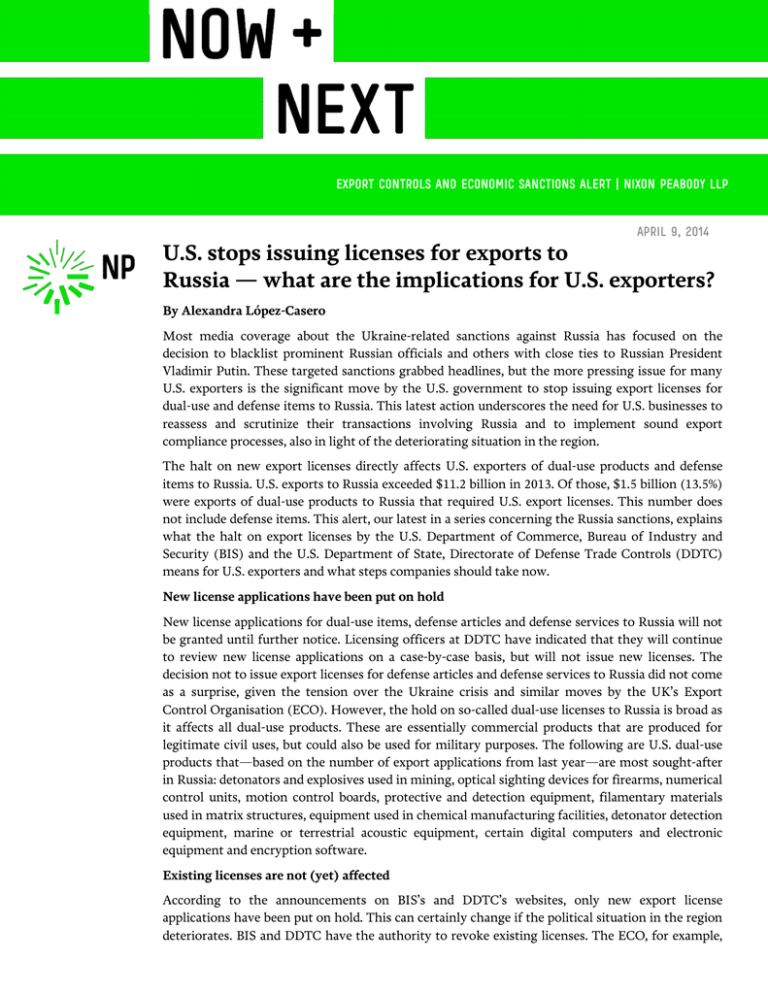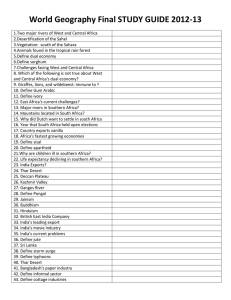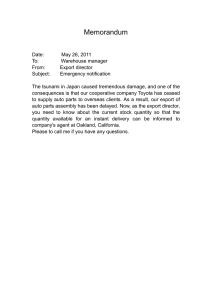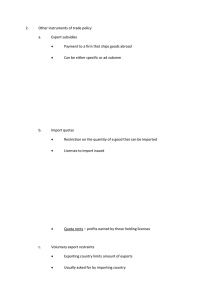
Export Controls and Economic Sanctions Alert | Nixon Peabody LLP
April 9, 2014
U.S. stops issuing licenses for exports to
Russia — what are the implications for U.S. exporters?
By Alexandra López-Casero
Most media coverage about the Ukraine-related sanctions against Russia has focused on the
decision to blacklist prominent Russian officials and others with close ties to Russian President
Vladimir Putin. These targeted sanctions grabbed headlines, but the more pressing issue for many
U.S. exporters is the significant move by the U.S. government to stop issuing export licenses for
dual-use and defense items to Russia. This latest action underscores the need for U.S. businesses to
reassess and scrutinize their transactions involving Russia and to implement sound export
compliance processes, also in light of the deteriorating situation in the region.
The halt on new export licenses directly affects U.S. exporters of dual-use products and defense
items to Russia. U.S. exports to Russia exceeded $11.2 billion in 2013. Of those, $1.5 billion (13.5%)
were exports of dual-use products to Russia that required U.S. export licenses. This number does
not include defense items. This alert, our latest in a series concerning the Russia sanctions, explains
what the halt on export licenses by the U.S. Department of Commerce, Bureau of Industry and
Security (BIS) and the U.S. Department of State, Directorate of Defense Trade Controls (DDTC)
means for U.S. exporters and what steps companies should take now.
New license applications have been put on hold
New license applications for dual-use items, defense articles and defense services to Russia will not
be granted until further notice. Licensing officers at DDTC have indicated that they will continue
to review new license applications on a case-by-case basis, but will not issue new licenses. The
decision not to issue export licenses for defense articles and defense services to Russia did not come
as a surprise, given the tension over the Ukraine crisis and similar moves by the UK’s Export
Control Organisation (ECO). However, the hold on so-called dual-use licenses to Russia is broad as
it affects all dual-use products. These are essentially commercial products that are produced for
legitimate civil uses, but could also be used for military purposes. The following are U.S. dual-use
products that—based on the number of export applications from last year—are most sought-after
in Russia: detonators and explosives used in mining, optical sighting devices for firearms, numerical
control units, motion control boards, protective and detection equipment, filamentary materials
used in matrix structures, equipment used in chemical manufacturing facilities, detonator detection
equipment, marine or terrestrial acoustic equipment, certain digital computers and electronic
equipment and encryption software.
Existing licenses are not (yet) affected
According to the announcements on BIS’s and DDTC’s websites, only new export license
applications have been put on hold. This can certainly change if the political situation in the region
deteriorates. BIS and DDTC have the authority to revoke existing licenses. The ECO, for example,
announced on March 18 that it suspended all existing licenses and license applications for exports
to the Russian military that could be used against Ukraine. The ECO also will suspend export
licenses for products that are incorporated in third countries and exported to Russia “where there is
a clear risk that the end product will be used against Ukraine.” The ECO has encouraged other
European countries to take similar action. Also, the German export control authority, Bundesamt
für Wirtschaft und Ausfuhrkontrolle, has, among other actions, suspended some existing export
licenses for the export of certain military equipment from Germany to Russia.
Deemed export licenses are on hold
License applications to employ Russian nationals in the United States that would have access to
export-controlled technical data also are affected. The wording in the BIS and DDTC
announcements does not specifically mention “deemed export licenses” (or so-called foreign person
employment licenses in the case of DDTC). However, the disclosure of export-controlled technical
data is generally considered an “export” of that data to the foreign national’s home country. For
example, if a Russian employee on an H1-B visa works in a laboratory or on the production floor of
a company in the United States and has access to export-controlled technical data, then that access
is deemed to be an export to Russia and is treated the same way as if the U.S. company actually
exported the controlled technical data to Russia. Given that BIS and DDTC have put export licenses
to Russia on hold, U.S. employers should assume that deemed export licenses involving Russian
national employees also will not be granted for the time being. Export compliance personnel
should alert the company’s HR manager, so that HR is aware of this important change before
extending an offer to affected job applicants.
Exports and re-exports of dual-use products to Russia that do not require export licenses are
not affected
U.S. companies can continue to export dual-use and other commercial items to Russia, as long as
these items can be shipped without a U.S. export license. This includes commercial products that
are only subject to EAR99 or AT (anti-terrorism) controls, which includes most consumer
products.
Re-exports to Russia, namely exports of dual-use and other commercial U.S.-origin items to Russia
that are already outside the United States, are not affected as long as they do not require a re-export
license. For example, the re-export of unlicensed U.S.-origin consumer electronics that are in the
European Union to Russia is not subject to this latest action, because it usually would not require a
re-export license. However, re-exports of defense articles to Russia (or elsewhere) generally require
a re-export license, which DDTC will not grant for the time being.
What steps should exporters take?
U.S. exporters, their world-wide subsidiaries and resellers of U.S.-origin products outside the United
States should stay abreast of the latest developments and carefully monitor BIS’s and DDTC’s
websites for new announcements regarding exports to Russia. Exporters will need to reconsider
new exports to Russia that require an export license from BIS or DDTC. Companies with pending
export licenses will need to contend with the delay and uncertainty caused by the halted license
approvals. This is a good opportunity to revisit export terms and conditions and other contractual
documentation to ensure that the terms sufficiently protect exporters for not being able to deliver
ordered products until the necessary export licenses have been received. HR managers also should
be cautious before extending offers to Russian nationals that may have access to export-controlled
technical data and, at a minimum, include appropriate language in offer letters. In addition, export
compliance managers should revise their export policies and procedures to reflect the new BIS and
DDTC licensing policy affecting exports to Russia.
Companies with existing licenses to Russia need to be extremely careful and look for general
announcements or specific correspondence from BIS and DDTC that may inform them that one or
more existing export licenses to Russia have been modified, suspended or revoked.
Exporters of civil nuclear materials, related services or technology to Russia should monitor
announcements by the U.S. Nuclear Regulatory Commission and the U.S. Department of Energy,
as they may also stop issuing export licenses or take similar action. U.S. companies, and particularly
their European subsidiaries, also need to make sure that they understand and comply with the UK,
German and other non-U.S. sanctions against Russia that may apply to them and their exports.
Anyone who exports to Russia or transacts with Russian individuals or companies should be aware
that, if the crisis deepens, the U.S. government will likely continue to expand the controls regarding
exports to Russia, as well as the overall sanctions that the President issued in the past few weeks.
For details on the existing Ukraine-related sanctions against Russia, please see our prior alerts: U.S.
ramps up sanctions in response to Crimea crisis, U.S. sanctions Russian and Ukrainian officials after
Crimea vote, and New Ukraine-related sanctions: what you need to know. We will continue to monitor
the developments relating to sanctions against Russia.
For more information, please contact your Nixon Peabody attorney or:
— Alexandra López-Casero at alopezcasero@nixonpeabody.com or 202-585-8372
— Grayson Yeargin at gyeargin@nixonpeabody.com or 202-585-8273
— Lindsey Nelson at lnelson@nixonpeabody.com or 202-585-8384
This newsletter is intended as an information source for the clients and friends of Nixon Peabody LLP. The content should not be construed
as legal advice, and readers should not act upon information in the publication without professional counsel. This material may be considered
advertising under certain rules of professional conduct. Copyright © 2014 Nixon Peabody LLP. All rights reserved.





